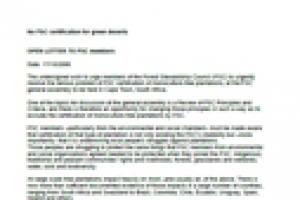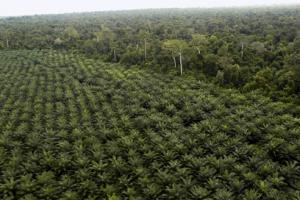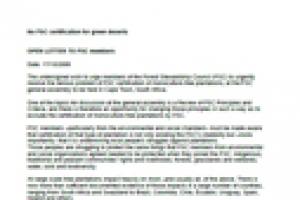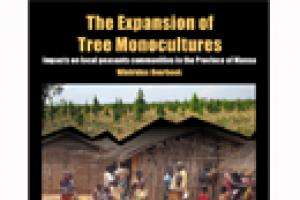“The crucial characteristic of monocultures is that they do not merely displace alternatives, they destroy their own basis. They are neither tolerant of other systems, nor are they able to reproduce themselves sustainably.” So wrote Vandana Shiva in her classic 1993 essay “Monocultures of the Mind.”
Large-Scale Tree Plantations
Industrial tree plantations are large-scale, intensively managed, even-aged monocultures, involving vast areas of fertile land under the control of plantation companies. Management of plantations involves the use of huge amounts of water as well as agrochemicals—which harm humans, and plants and animals in the plantations and surrounding areas.
Bulletin articles
29 September 2010
The territories that make up what is known today as Latin America have two main features in the eyes of big corporations and business conglomerates: they encompass vast areas of land, and they are a source of highly coveted commodities: wood, palm oil, commercial crops, meat, wool, raw materials for agrofuels, genetic resources, land, water. As such, they are a magnet for big capital.
Action alerts
31 August 2010
Press release by World Rainforest Movement, Latin American Network against Monoculture Tree Plantations RECOMA, Rettet den Regenwald, Salva la Selva, Ecologistas en Accion and Biofuelwatch
Frankfurt, 31st August 2010
From 31st August to 1st September, the World Bank is holding their final stakeholder consultation seminar about future finance for palm oil projects in Frankfurt am Main, Germany.
Bulletin articles
30 August 2010
La production d’huile de palme est séculaire au Bénin et elle s’est toujours faite surtout par des méthodes artisanales. Ce sont précisément les femmes qui fabriquent l’huile de palme pour la consommation locale. Or, au nom de la « modernisation de la production », le rôle des femmes se voit aujourd’hui menacé.
Other information
29 July 2010
The oil palm is native to this and other countries of the region, where its sap is collected to make palm wine, its dates used in cooking oil produced in cottage industries. The product was traditionally exported before the establishment of plantations, that by 1968 covered some 7,000 hectares. The seedlings planted originated from more productive varieties developed in Asia. Although those plantations were abandoned, they continue to produce some bunches, similar to those of the native palms, for family consumption.
Other information
29 June 2010
After French industrialist Vincent Bolloré filed two lawsuits against Radio France Inter, both for alleged defamation regarding plantations operated by SOCAPALM (Société Camerounaise de Palmeraies), photographer Isabelle Alexandra Ricq and researcher Julien-François Gerber addressed ten lies typically used to defend Bolloré, one by one.
Bulletin articles
30 May 2010
Asia Pulp and Paper (APP) is one of the most controversial and destructive paper companies on the planet. The company has cleared vast areas of rainforest to feed its two million tonnes-a-year pulp mill in Sumatra, Indonesia.
Bulletin articles
30 May 2010
The government of Mozambique is in the process of expanding large-scale monocultures of alien, fast-growing tree species, mainly eucalyptus, pine and teak trees in the northern part of the country.
Action alerts
20 May 2010
On May 18th 2010, a letter to the World Bank representatives has been sent on behalf of more than 80 organizations from more than 34 countries urging the World Bank to stop funding oil palm plantations.
In response to the growing criticism relating to the unsustainability of oil palm plantations, the World Bank decided to suspend its funding for the palm oil sector and to request an audit of its International Finance Corporation (IFC) from the Ombudsman.
Action alerts
18 May 2010
LETTER SENT TO THE WORLD BANK:
Dear Sir/Madam,
With reference to the World Bank meeting to be held in San José, Costa Rica on 17th to 18th May 2010, within the framework of a consultation process for the bank’s strategy on palm oil financing, the undersigned would like to express our concern about the possible future involvement of the World Bank in financing oil palm plantations.
Publications
18 May 2010
A field report, by Winfridus Overbeek.
This publication is the result of a visit to Mozambique in November 2009 by two activists involved in the struggle against tree monocultures in the Brazilian state of Espírito Santo. This visit was made possible by the World Rainforest Movement (WRM) with the goal of exchanging experiences about large-scale tree monocultures.
Other information
29 April 2010
On 19 and 20 March this year, peasant, indigenous and quilombola* communities and movements from the States of Espirito Santo and Bahia who are fighting to get back their territory invaded by monoculture eucalyptus plantation companies, paid a visit to Raiz and Vereda Funda in the locality of Rio Pardo in the north of Minas Gerais, in solidarity and to exchange experiences with these two communities struggling to regain their traditional territory.




